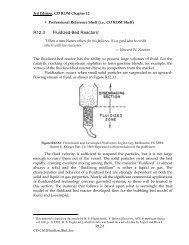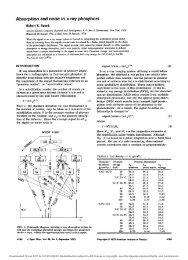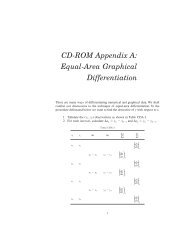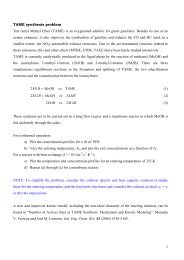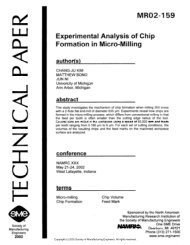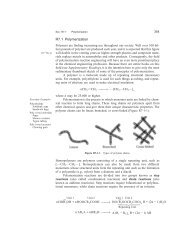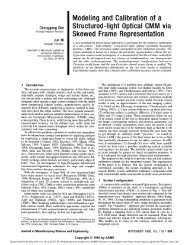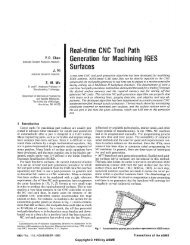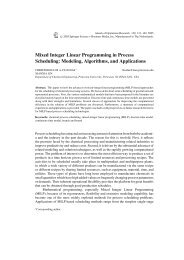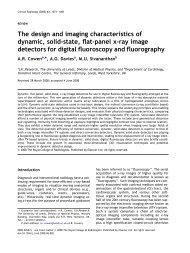Conceptual framework: What do you think is going on?
Conceptual framework: What do you think is going on?
Conceptual framework: What do you think is going on?
You also want an ePaper? Increase the reach of your titles
YUMPU automatically turns print PDFs into web optimized ePapers that Google loves.
03-Maxwell.qxd 10/1/2004 3:13 PM Page 36<br />
36 QUALITATIVE RESEARCH DESIGN<br />
I am always collecting such prefabricated parts for use in future arguments. Much<br />
of my reading <str<strong>on</strong>g>is</str<strong>on</strong>g> governed by a search for such useful modules. Sometimes I<br />
know I need a particular theoretical part and even have a good idea of where to<br />
find it (often thanks to my graduate training in theory, to say a good word for what<br />
I so often feel like maligning). (1986, p. 144)<br />
Before describing the sources of these modules, I want to d<str<strong>on</strong>g>is</str<strong>on</strong>g>cuss a particularly<br />
important part of <str<strong>on</strong>g>you</str<strong>on</strong>g>r c<strong>on</strong>ceptual <str<strong>on</strong>g>framework</str<strong>on</strong>g>—the research paradigm(s)<br />
within which <str<strong>on</strong>g>you</str<strong>on</strong>g> situate <str<strong>on</strong>g>you</str<strong>on</strong>g>r work.<br />
CONNECTING WITH A RESEARCH PARADIGM<br />
One of the critical dec<str<strong>on</strong>g>is</str<strong>on</strong>g>i<strong>on</strong>s that <str<strong>on</strong>g>you</str<strong>on</strong>g> will need to make in designing <str<strong>on</strong>g>you</str<strong>on</strong>g>r study<br />
<str<strong>on</strong>g>is</str<strong>on</strong>g> the paradigm (or paradigms) within which <str<strong>on</strong>g>you</str<strong>on</strong>g> will situate <str<strong>on</strong>g>you</str<strong>on</strong>g>r work. Th<str<strong>on</strong>g>is</str<strong>on</strong>g> use<br />
of the term “paradigm,” which derives from the work of the h<str<strong>on</strong>g>is</str<strong>on</strong>g>torian of<br />
science Thomas Kuhn, refers to a set of very general philosophical assumpti<strong>on</strong>s<br />
about the nature of the world (<strong>on</strong>tology) and how we can understand it (ep<str<strong>on</strong>g>is</str<strong>on</strong>g>temology),<br />
assumpti<strong>on</strong>s that tend to be shared by researchers working in a<br />
specific field or traditi<strong>on</strong>. Paradigms also typically include specific metho<str<strong>on</strong>g>do</str<strong>on</strong>g>logical<br />
strategies linked to these assumpti<strong>on</strong>s, and identify particular studies that<br />
are seen as exemplifying these assumpti<strong>on</strong>s and methods. At the most abstract<br />
and general level, examples of such paradigms are philosophical positi<strong>on</strong>s such<br />
as positiv<str<strong>on</strong>g>is</str<strong>on</strong>g>m, c<strong>on</strong>structiv<str<strong>on</strong>g>is</str<strong>on</strong>g>m, real<str<strong>on</strong>g>is</str<strong>on</strong>g>m, and pragmat<str<strong>on</strong>g>is</str<strong>on</strong>g>m, each embodying very<br />
different ideas about reality and how we can gain knowledge of it. At a somewhat<br />
more specific level, paradigms that are relevant to qualitative research<br />
include interpretiv<str<strong>on</strong>g>is</str<strong>on</strong>g>m, critical theory, femin<str<strong>on</strong>g>is</str<strong>on</strong>g>m, postmodern<str<strong>on</strong>g>is</str<strong>on</strong>g>m, and phenomenology,<br />
and there are even more specific traditi<strong>on</strong>s within these.<br />
It <str<strong>on</strong>g>is</str<strong>on</strong>g> well bey<strong>on</strong>d the scope of th<str<strong>on</strong>g>is</str<strong>on</strong>g> book to describe these paradigms and how<br />
they can inform a qualitative study; good d<str<strong>on</strong>g>is</str<strong>on</strong>g>cussi<strong>on</strong>s of these <str<strong>on</strong>g>is</str<strong>on</strong>g>sues can be<br />
found in Creswell (1998) and Schram (2003). However, I want to make several<br />
points that are relevant to using paradigms in <str<strong>on</strong>g>you</str<strong>on</strong>g>r research design:<br />
1. Although some people refer to “the qualitative paradigm,” there are<br />
many different paradigms within qualitative research, some of which differ<br />
radically in their assumpti<strong>on</strong>s and implicati<strong>on</strong>s (cf. Denzin & Lincoln, 2000;<br />
Pitman & Maxwell, 1992). It will be important to <str<strong>on</strong>g>you</str<strong>on</strong>g>r research design (and<br />
<str<strong>on</strong>g>you</str<strong>on</strong>g>r proposal) to make explicit which paradigm(s) <str<strong>on</strong>g>you</str<strong>on</strong>g>r work will draw <strong>on</strong>,<br />
since a clear paradigmatic stance helps to guide <str<strong>on</strong>g>you</str<strong>on</strong>g>r design dec<str<strong>on</strong>g>is</str<strong>on</strong>g>i<strong>on</strong>s and to<br />
justify these dec<str<strong>on</strong>g>is</str<strong>on</strong>g>i<strong>on</strong>s. Using an establ<str<strong>on</strong>g>is</str<strong>on</strong>g>hed paradigm allows <str<strong>on</strong>g>you</str<strong>on</strong>g> to build <strong>on</strong><br />
a coherent and well-developed approach to research, rather than having to<br />
c<strong>on</strong>struct all of th<str<strong>on</strong>g>is</str<strong>on</strong>g> <str<strong>on</strong>g>you</str<strong>on</strong>g>rself.




